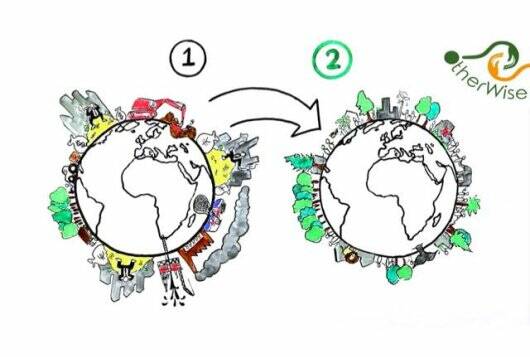The lasts weeks we have been focusing on the theme ‘New economies’. We have shared articles and videos on Facebook and Instagram about degrowth, coronavirus capitalism, GDP, quality of live and mitigating climate change. Last Tuesday evening, 14th of April, we organized a concluding online event to reflect on coronavirus capitalism and on other topics that have come along.
The event was inspired by the webinar on 'coronavirus capitalism’, streamed live on YouTube at the end of March. According to Naomi Klein, one of the speakers, crises are being used by elites to push through their pre-existing wishlists. Also during the current crisis. At the same time, there is an opportunity for alternative ideas to be implemented. We asked Robert Fletcher, working in the Sociology of Development and Change group at Wageningen University, to reflect with us on this and more. On the 14th of April we met online on Skype for Business with Robert and many others to discuss our economic system and the possible transformation to a more sustainable and just system.
Robert confirmed that disaster capitalism is taking place. Especially in the field of tourism, one of the topics his research focuses on. In an article that he wrote with colleagues, it is showed that the United States is giving big support to airlines, cruise lines and hotels. He compared the current crisis to the 2008 crisis that did not bring any changes for a more equal world, but led to more inequalities. He urged us to be attentive of disaster capitalism practices.
The crisis that we are witnessing now, seems to be more profound than the one of 2008. As a result, this time governments and companies might be forced to make use of alternatives. And there are many alternatives, centered among sustainability and equality, lying around. It is an important moment to raise awareness about these alternatives, such as degrowth, investing in renewable energy sources and depth remission. Researchers of Wageningen are for example taking the lead in proposing a plan for post-neoliberal development, that so far has been signed by 170 professors in the Netherlands and has been published in the Dutch news.

After the talk with Robert, the floor was opened for questions and comments. Many different issues passed by. We talked about rules and regulations. We now see that it is possible to introduce certain politics and regulations, for example, limiting the air traffic. We can continue with these and other regulations. The government can play a very important role. However, someone mentioned that if we regulate for example air traffic, this would come at a financial cost. Increasing taxes, and especially taxes for the richest, was offered as one solution. It was also mentioned that we should be aware of the cultural aspect. We got used to a certain way of living. Robert responded that that is allowed by the structures we are in. He also mentioned that we do see changes in the culture. Look for example at the word ‘fly shame’. People are rethinking their travel habits. Another topic that was discussed was the need of financial growth to prepare for next pandemics. A response from the audience was that financial growth is not the only way to prepare. Resources could be more usefully allocated, so that there are more people working in positions that make a society resilient and sustainable. This also brought us to the discussion whether growth is the right measure for success.
Other topics that passed by were global trade, locally embedded economies, the population in rural areas… It was really nice to be come together again around this important topic and to hear about all these different - connected - topics. We hope this sparked a sense of connection and motivation. We are limited in our physical movements, but we shouldn’t feel limited in our actions. We can still be attentive to disaster capitalism practices and raise awareness of sustainable and just alternatives.
- Review by Lois Markusse

